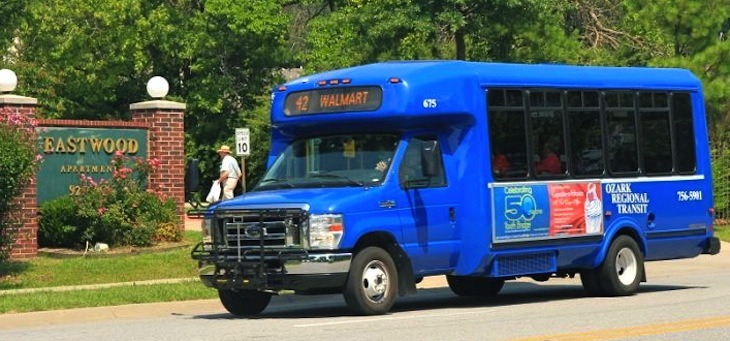Northwest Arkansas transit providers coordinate efforts, work to establish transportation plan
by July 26, 2017 5:25 pm 475 views

A lot of transit providers in the state don’t realize they’re coordinating services because they might be working together on a small scale, said Greg Nation, public transportation administrator for the Arkansas Highway and Transportation Department.
“They look at coordination being a big, big animal,” Nation said.
This month, Nation and other highway department staff have found out how much transit providers have been coordinating with each as they meet with them to develop the Coordinated Public Transit Human Services Transportation Plan. Every five years the highway department develops the plan for public transportation needs, and this is the third effort to develop it since 2007, Nation said. The Federal Transportation Administration requires the highway department to put together the plan.
Arkansas transit providers have been meeting to coordinate efforts and to be a part of the plan in order to receive federal funding, said J.D. Allen, executive vice president for Alliance Transportation Group. The highway department brought on the transportation company to develop the plan.
On Tuesday (July 25), about 10 transit providers met to hear about the plan at the Northwest Arkansas Regional Planning Commission office in Springdale. It was the sixth meeting the highway department has hosted for the plan, and meetings are set to take place in Texarkana and Jonesboro on Wednesday and Thursday. They’ve been an opportunity for transit providers to coordinate efforts and to understand the services they provide.
Joel Gardner, executive director of Ozark Regional Transit, explained a maintenance agreement the Springdale-based transit provider offers to the Elizabeth Richardson Center and how it’s benefited both organizations.
“It puts money in our pocket,” Gardner said. “It keeps our mechanics busy.”
After he explained the agreement, Lori Proud, director of the Springdale Senior Center, was interested in setting up a maintenance agreement with ORT for its vehicles. The center operates four vehicles: two for transportation and two for meals on wheels.
“I’m going to be calling you,” Proud said to Gardner.
About five years ago, ORT and Fayetteville-based Razorback Transit worked to cut back on duplicating services, said Adam Waddell, associate director for Razorback Transit. While the transit provider only offers fare-free bus service within Fayetteville, there were roads where the service would overlap. As a result of the coordination between the two providers, Razorback Transit offers a one-way bus pass, allowing its riders to transfer onto ORT’s buses without a fare.
As part of the work to develop the plan, transit providers were asked to complete a survey on the services they offer and the issues they face.
“Funding is one of our biggest hurdles,” Waddell said.
Recruiting drivers is another challenge. In Northwest Arkansas, there are between 10,000 and 15,000 job openings for drivers, he said. The transit provider recently increased its salary for full-time drivers to $30,000 annually. Another transit provider was paying drivers slightly above minimum wage and at minimum wage before the start of the year. The driver shortage might never be resolved, Allen said.
“If the vehicles ran themselves, cool, but they won’t for quite a while.”
Another concern from a transit provider was how to measure output. Allen explained the federal government is moving to performance-based planning and looks to measure output. The plan is to offer data such as how much providers have improved in ridership over the years.
Another part of the highway department’s work to establish the five-year transportation plan will include a rider survey. The goal is for the plan to be completed by the end of the year, Nation said.
